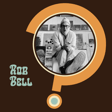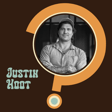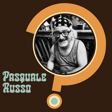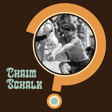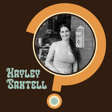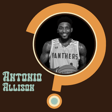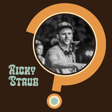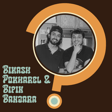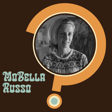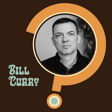Introduction and Guest Overview
00:00:10
Speaker
Hello and welcome to What's Next. My name is Joel and this is my podcast. Today I am sharing my conversation with Dr. Tracey Dennis Tiwari. Tracey is a scientist, entrepreneur, and author. She is a professor of psychology and neuroscience and director of the Emotion Regulation Lab at Hunter College in New York City.
00:00:31
Speaker
and co-founder and chief science officer of Arcade Therapeutics, where she is turning neuroscience research into gamified, clinically validated digital therapeutics for mental health.
Tracey's Career Focus on Anxiety
00:00:42
Speaker
She recently wrote a book called Future Tense, why anxiety is good for you even though it feels bad. I was left feeling very grateful for this conversation with Tracy.
00:00:52
Speaker
She's focused a lot of her career on understanding anxiety, but also sharing what she's learned to help people who struggle with it, which as it turns out is all of us. I worked with Tracy on a video project about her work with Arcade Therapeutics this past summer. I spent a few days with her in her lab, at her office, with her
00:01:13
Speaker
team interviewing strangers together throughout Central Park for a documentary. I really enjoyed my time with her and her perspective and I immediately hoped she would come on the podcast to talk about her work. She has so much experience and knowledge to share and care. She really cares about this, how anxiety is affecting people.
Beginning of Conversation: Technology and Podcast Motivation
00:01:34
Speaker
I'm just incredibly grateful and humbled that she agreed to come on the podcast.
00:01:39
Speaker
So, please enjoy my conversation with Dr. Tracey Dennis Tiwari.
00:01:50
Speaker
So much of this technology we think we understand, but it seems to always surprise us. I know. Is this some video? Should I make sure the camera's positioned or is it just audio? Yeah, it's just audio. Oh, okay. Great. So we're good. We're good to go. Awesome. How are you, Tracy? Good. Thank you so much for inviting me on your podcast.
Tracey's Musical Background and Transition to Psychology
00:02:10
Speaker
Tell me more about
00:02:11
Speaker
how this came about. This is so cool. Yeah, sure. I'm so happy you're here. I started this podcast earlier at the beginning of 2023 for a couple of reasons. One is I find that the questions always come up of what are we doing? And I just consistently don't have a great answer for that.
00:02:35
Speaker
This is your attempt to answer that question little by little. I'm talking to people about how they got to where they are, some of the ways in which they've figured out their own lives and they're still figuring it out. And I often find that just hearing stories of how other people navigated their own situations of being stuck or anxiety or whatever it is, is helpful. The most encouraging thing for me is when I hear that I'm not the only one
00:03:04
Speaker
100%, 100%. Okay, that sounds great. I love that premise for conversation. Yeah, just to say again, thanks for being here. I'm really excited to have you and to have this conversation with you. When we first started working together on the video projects earlier this year, you know, I had a secret hope that I'd maybe be able to have you on the podcast. So I'm so thrilled to spend time with you. So thank you for thinking of me.
00:03:30
Speaker
Yeah, absolutely. I'm just, yeah, I'm really glad this worked out. So you are a psychologist and an anxiety expert. And you came out with a book last year in 2022 called Future Tense, why anxiety is good for you even though it feels bad. And anxiety just plays such a big role in how we make decisions for our future. And it's something that I really want to know more about.
00:03:54
Speaker
But before we even jump into any of the anxiety specifically, I think it's really worth talking about who you are and how you got to where you are now. So let's just start there. Where did you grow up, Tracy? Where was your childhood spin? I grew up in upstate New York, but I'm real upstate. I say that because as a New Yorker now and living in New York City.
00:04:16
Speaker
We talk about upstate as being, you know, Westchester County, which is like an hour or so north of New York City, but real upstate is in the Great Lakes. So I grew up in Rochester, New York, an hour from Canada. We're way up there. Yep. Kodak. Kodak. Exactly. Eastman, Eastman Kodak. I actually went to the Eastman School of Music when I studied classical music and played the oboe.
Coping with Childhood Depression and Anxiety
00:04:38
Speaker
And so it was a really, you know, it is a small, a smallish city. It's a conservative city.
00:04:46
Speaker
But there are lots of arts and there are lots of, um, there was, there were wonderful opportunities for me to, to really develop my creative side. And so, you know, that was something that I think is a really special thing that Rochester has to offer. Were your parents into the arts or what did they do? No, no, they were, they, they appreciated the arts, you know, I mean,
00:05:12
Speaker
My dad was actually more of an athlete when he was growing up. My mom was more of a stay-at-home mom. But when I started becoming interested in music, they just 100% went there to support me in doing that and going deeper. And when it looked like I had some sort of a facility for it, some sort of an ability in that realm, they were right there to say, okay,
00:05:37
Speaker
We don't know a lot about this, but do we get her lessons? Do we have, you know, do we get her in? You know, I've got into the Rochester Philharmonic Youth Orchestra early on. You know, they really were there to, even though they didn't have that same background to help me figure out how to do this strange thing of becoming a classical musician.
00:05:52
Speaker
Yeah, I was a guitar player as a kid and I had people I was looking up to who I wanted to be like, what, what, like, how do you get into the oboe? Oh God. Right. I mean, that's, I want to hear that story actually, who your archetypes were. Well, you know, I had a wonderful, when I was in grade school, I was about, I guess I was eight or nine years old.
00:06:13
Speaker
I went to school in a suburb of Rochester called Penfield. And they had in a public school an incredible music program. And our teacher, Mr. Dozier, at our elementary school, he
00:06:29
Speaker
was able to, there was a point, I guess, in fourth grade or fifth grade, whatever it was, when he sat us all down in our music room and he demonstrated every single instrument to us that we had the option to play.
Shift from Music to Psychology and Spiritual Practices
00:06:44
Speaker
So it wasn't just string instruments. He was a flautist actually himself. But he could play every instrument. To some degree, which was amazing. Yeah, he was great. It was really, in that sense, you know,
00:06:58
Speaker
a shout out to Mr. Dozier because without him, I definitely would never have even dreamt of or understood what a woodwind instrument was like the oboe or even come across the oboe. So he demonstrated all the instruments, all the kids then, you know, just literally raise your hand. I want to play the violin. I want to play the flute. And after everyone had chosen, I was still sort of hemming and hawing. No one wanted the oboe.
00:07:27
Speaker
And I felt sorry for it. Poor oboe. Yeah, poor oboe. Even at age of nine, I guess I've always been for the underdog. Yeah. And so I chose the oboe. And it's a very, you know, for people who don't know.
00:07:44
Speaker
It is a woodwind instrument. It looks a bit like a clarinet, but it's skinnier. And it has a very narrow reed on the top that's actually a double reed. And there are very few double reed instruments out there. There's the bassoon, the oboe, the English horn, which is a type of an oboe, really, like a big oboe. And that's sort of about it. Other instruments like saxophone are a single reed that goes into a mouthpiece. But here you just have these two pieces of cane.
00:08:11
Speaker
And they sort of get bound together and they vibrate and you have to use your mouth to control them and hold them and you somehow make a sound out of this instrument. Do you have to make your own reeds for the oboe too? Eventually, when you get good at it. But in the early days you sort of get these very
00:08:29
Speaker
these rough instruments called read, you know, you buy these reads at the music store, like you sort of get a lot of like noises and, you know, and the oboe, for those who know Peter and the wolf, the, you know, the classic Tchaikovsky, the oboe plays the duck. And so it's like, you know, and so it's not, you know, none of the, believe me, none of the other little nine year old girls wanted to play the oboe. It wasn't, you know, it wasn't, um,
00:08:55
Speaker
But again, I think what inspired me were my feelings, my personal feelings for this little oboe that got left out. And Mr. Dozier knew, I mean, again, amazing he knew how to teach the oboe. He was able to get me started. And then you just committed to it.
00:09:10
Speaker
Yeah, I'm sure, you know, I'm remembering back and I remember my mom and dad telling me how painful it was those first early days when I would practice at home. Because you really, I mean, you have this wild, these two reeds vibrating together and you sort of have to wrangle it with your mouth and you have this embouchure you develop over many years. So the early days were just, I mean, very, I mean, there's, I don't know where the motivation came, but I guess I loved music. I loved the,
00:09:40
Speaker
the process of learning to play music.
Volunteering and Exploring Resilience
00:09:43
Speaker
I loved, I think I loved, you know, recognizing notes on a, you know, on a staff. And all of this appealed to me enough to keep me going. And then one day I guess I just got good enough. And my teacher, again, Mr. Dozier, so much depends on having these amazing educators in our life, right? Yeah. And I think he was like, you know, you're pretty good at this. Do you want to take it a little further? And so first there were some private lessons and small ensembles and youth orchestras. And I guess it was one step at a time.
00:10:10
Speaker
Wow. Yeah. Do you feel that kids who display some more artistic tendencies lean a little bit more towards anxiety? Did you experience anxiety as a kid? I was more leaning towards depression.
00:10:25
Speaker
There were certainly some anxieties in there, but what I really, once I hit adolescence, what I really struggled with was major depressive disorder. I was diagnosed with major depressive disorder. I was about, I want to say about 14. Okay. So, you
Understanding Anxiety and Resilience
00:10:38
Speaker
know, anxieties often in the mix is, you know, anxiety and depression are so, you know, as we say co-morbid, but they really go together in some ways, you know, depression. A lot of that is about loss. It's about difficulty kind of, um,
00:10:54
Speaker
being motivated by the positives in life. It's being able to tune in to the rewarding qualities of life around you and the joy. And you just, it's the threshold becomes so high to feeling those feelings. Like it just, it's just so hard to get there that, you know, you start to deactivate. And that was, you know, something I was struggling with. At the same time, anxiety is more about this sort of weariness, uncertainty, threat, potential for threat. And I think what was affecting me more from
00:11:23
Speaker
a psychological perspective was a sense of, you know, where's the joy, feelings of loss, experiences of loss I'd have. And so even though I remember having a panic attack, for example, in the midst of experiencing depression, but that was never my greatest challenge or my greatest vulnerability. And I think we all have them. We all have those points, right? Those vulnerability points or, you know, points of where when things get really hard or stressful,
00:11:54
Speaker
Here's how I, here's where my coping can start to be less helpful to me. And for me, it took the form of depression. Okay. Oh, that's interesting. So you, you would describe even depression as a form of coping with feelings that we're not sure how to, that we don't know how to handle that are overwhelming. Yeah, because depression, I mean, depression is a, is an emotion like we'll call it depressed mood, right? Okay. Really major depressive disorder is a whole series of symptoms.
00:12:21
Speaker
of behaviors, of signs, of disruptions, and often, especially with the mood and anxiety disorders, with what we even sometimes term the distress disorders, meaning this whole set of mental illness diagnoses that are really about these feelings of emotional distress and the ways that we contort ourselves in our lives to deal with those feelings of distress.
00:12:47
Speaker
So if you think about something like major
Anxiety in Society and Its Impact
00:12:50
Speaker
depression and you have this deep sense of loss, of not being able to connect, of not being able to get rewarding good things in life, you know, one symptom is you then you give up, you withdraw. So that withdrawal or that loss of interest and pleasure in life, that's just one of the symptoms of major depressive disorder. But in one from one way of thinking, it's a way that you're coping with these deep feelings of loss and hopelessness.
00:13:14
Speaker
Having disruptions in sleep or eating, those are symptoms of major depressive disorder. We all know how we use food as a way of coping. Stress eating or whatever. It's something we all experience on a spectrum. When you have major depressive disorder, you're either eating too much or too little. And we can see that as a way fundamentally of coping with these really
00:13:41
Speaker
deeper, deep set feelings of loss, of hopelessness, of not being able to predict or envision a future where you have something worth living for, those kinds of feelings. There's also this kind of sense of a locus of control that's very important with depression and attributions that we make about bad things that happen to us. When we're depressed, we tend to make attributions for the bad things that happen.
00:14:09
Speaker
We attribute that to being internal, stable, and global, meaning we blame ourselves. We think it's going to be this way consistently all the time and for every situation. But again, these are responses.
00:14:23
Speaker
to the mood, it's like the Buddhist parable about the two arrows, where there's this idea that you have these two arrows that pierce you, the first arrow, we can compare that to that first emotional reaction. That causes suffering, it's painful. The second arrow, so to speak, is what we do in response to that first arrow. And the first arrow, the pain's gonna go away, but when we get pierced again, we respond to that first suffering.
00:14:49
Speaker
That's what perpetuates suffering. So when I think about mental health challenges, especially anxiety and depression, it's that second arrow. It's what do we do with the inevitable sorrows and threats and good and bad things that happen in life and really our desire to find the good in our life. Yeah.
Building Resilience and Emotional Understanding
00:15:10
Speaker
So when you were younger, were you using the oboe to cope with some of those feelings? Was that a part of your response to some of the negative things you experienced?
00:15:19
Speaker
Yeah. I mean, I think even before I had a strong sense of negative feelings happening, it was so satisfying because, you know, from a coping perspective, you can say, what does it do? It gives you joy. It gives you a sense of flow, right? It gives you a sense of mastery. It gives you a sense of community because I loved playing in ensembles, right? So all those things, whether or not we're coping with anything, these are things that make life worth living, right? It's like connection, flow, you know, dedication, purpose. I felt a sense of purpose that I was pursuing.
00:15:48
Speaker
this tradition of classical music that was greater than I was and where I felt transported by it. So I think that they just created this experience of being a musician and striving to be as best as I could be was positive. And yeah, I think it was also, it gave me a way of coping, but at some point it wasn't doing enough. And that's everyone's story, right? That we have resources and ways of
00:16:15
Speaker
responding to the hardships of life and sometimes what life throws at you just super it's just it outweighs yeah what you can bring to the table at any given point right yeah it seems like that's quite often the case unfortunately yeah unfortunately and and the thing that I think is hopeful about that is that if when we think about it like a balance
00:16:39
Speaker
We don't have to say, oh, I'm just broken and I can't cope. But you say right now at this moment in time, the challenges, the stressors, the however you want to get, what name you want to give to it, it's outweighing the skills I have. And that's not my fault, but it's an opportunity to try to kind of skill build as much as I can to meet the challenge and change maybe whatever circumstances in my life that I can, if it's in my control.
00:17:05
Speaker
So it's kind of a mindset when you think about it as a balance. I really love that. So how did you get from your vision for your life was playing the oboe professionally, but that didn't happen. You're not an oboe player. You're a psychologist now. So it's a very different path. So how did that come about?
00:17:29
Speaker
It feels in retro, you know, one way of looking, telling that story, so to speak, or looking back at it is that it was a very sudden out of the blue change when I was a junior at conservatory in college, where I just sort of I had my I finished my junior recital.
00:17:44
Speaker
And then I just really sort of announced to everyone, I'm switching to psychology, you know, and, um, and I got really interested, you know, I was taking courses in psychology and I just got really interested in it. And I'm just interested more in this than I am in music and you know, by,
Cultural Influences on Emotion Regulation
00:17:58
Speaker
you know, and, and it was sort of, um, sudden like that. I regret now, but as a young person, I didn't prepare the people around me.
00:18:05
Speaker
better for what was kind of probably been working in me for a while. So that's one version of the story where I just, you know, and I was able to, by the end of my senior year, still finish college. I was at the Eastman School of Music, which is part of the University of Rochester. And so I was able, because I already had some academic coursework under my belt, to just finish out my psychology coursework and actually finish
00:18:31
Speaker
with a BA in psychology by the end of the four years. So I was, so that was nice. That was, that was seamless. It allowed me to do that. That's the one version of the story is I just changed my mind. The other version of the story goes back further, which is that I got really interested in meditation and Hinduism and yoga and these practices when I was about 17 years old, I want to say. So this was before this, I was in the music studies, but this was before I went to conservatory and I,
00:19:01
Speaker
had just sort of come through my depressed period.
Faith, Anxiety, and Spiritual Growth
00:19:04
Speaker
I was actually in kind of a good place, but still struggling. And I found these spiritual practices and it really changed everything for me, for the better. Yeah. In what way? So as I was exposed to some of these practices, I went to what are called pujas, which are these, you know, the Hindu rituals. I took some yoga classes. I started understanding what meditation was. And as I tried out,
00:19:29
Speaker
these practices as I was in the presence of these practices, I just felt this shift in my consciousness. I felt more peaceful. I felt curious about my inner life in a way that I hadn't before. I just felt kind of dread about my inner life before, right? Because it was suffering. It was like, you know, I was depressed. I was struggling. And I felt through these techniques that there was, wait a second, it's like there's this, it's almost like a technology of consciousness.
00:19:59
Speaker
It's this idea that you can do practices and change your internal world and actually shape, therefore, your external world by changing your internal world. And there was this really a deep sense of empowerment of
00:20:16
Speaker
of autonomy that I hadn't had never experienced before. I mean, I sort of felt that as
Arcade Therapeutics and Digital Therapies
00:20:20
Speaker
a musician because I felt I was good at it and I enjoyed it. And I had these, I had a beautiful experience, but it wasn't this sense that I could actually kind of exercise through my will and through my effort, a change in my experience of the world. And that was really fascinating to me.
00:20:41
Speaker
It was hopeful. And as I delve deeper, and I also realized there was a lot academically to learn because if you learn about yoga or Hinduism, there's like, you have to understand Sanskrit. You have to understand the mantra shastra, which is the science of sound, which also appealed to me as a musician. So when you recite different prayers or
00:21:03
Speaker
You know, you're actually, there's a beautiful and very rigorous science of, or a technique to how you recite the prayers. And it has to be perfect. I understood that as a classical musician. It's like, you say the Sam skirt, like you play Bach, like you play Bach and you play Mozart like you play Mozart. And there's no, you know, so that purity of technique.
00:21:24
Speaker
Wow, yeah. It was very fascinating to me. I took a few years of Sanskrit. I loved that. Wow, that seems so complicated.
Conclusion and Appreciation
00:21:33
Speaker
It was really complicated, but I threw myself into it. Committed, yeah. But having something that felt, again, greater than myself to commit to that was also, I'd also been, I think, yearning for a spiritual path. Did you grow up with any religion?
00:21:48
Speaker
Catholicism, but I chose even at age of 13 when you typically confirm in the Catholic Church, I chose not to confirm. And my family supported me in that because I didn't feel that this was a religion that I could commit to wholeheartedly. And I wanted to explore more.
00:22:07
Speaker
Um, and you know, I'm Italian and I'm Italian and Irish. And so, you know, I don't know that my great grandmother's ever found out that that would have been pretty upsetting. That would have been a heartbreak. Um, yeah. So, so I think that, so I say all that and go into that detail because when I threw myself into learning about this completely different
00:22:29
Speaker
way of thinking about your inner life. And I could all of a sudden meditate and memorize, you know, Sanskrit recitations for hours. I could, you know, I could, I all of a sudden was like, you know what?
00:22:41
Speaker
I'm really interested in psychology. I'm starting to be interested in consciousness and all these other things. And I actually believe that I could do something like a PhD. Because I can do this, which is hard. Was this during your undergrad that this whole journey of... No, it started in high school. Oh, really? Wow. Yeah, when I was 16 or 17. Wow. So I think probably 17 was a junior. How did you get exposed to it in the first place? My poetry teacher's cousin,
00:23:10
Speaker
whom I met at her Day of the Dead party. I swear to God. That is awesome. I did go to a School of the Arts for high school, so I went to the Rochester Soda School of the Arts. And there was just something that she said about it that connected with you. I talked to her cousin, Bill, and he just told me. Get it, Bill.
00:23:35
Speaker
Um, and I, I just was intrigued. So anyway, so it was a funny, it was one of those things. And the minute I walked into this place where they were performing these, these, this, this ritual, it was as if I had this flash of familiarity. Like it just felt, it was completely foreign to me in the strictest sense, but it felt incredibly.
00:23:57
Speaker
comfortable to me at the same time. So it just so got beyond this path. And then I guess the third leg of that stool is that I started volunteering at a research center for kids who were maltreated. And I fell in love with these kids. They had gone through so much. My duties had to do with actually documenting the abuse they'd suffered. Like we actually coded and quantified what they'd gone through, terrible, terrible abuse.
00:24:23
Speaker
And then when I worked with these kids, um, in other contexts, I could see that they weren't, you know, yes, they'd suffered trauma, but they were still so resilient. Yeah. They were bright, beautiful, you know, children with so much creativity and life still in them. And I couldn't, I wanted to understand how is that possible? Yeah. And how could I do something in the world that could help children cultivate that, um,
00:24:51
Speaker
that resilience and honestly, and I'm not comparing kids to the oboe, but I kind of felt like they were the underdogs too. They'd gone through so much that they should never have gone through. And I think I was rooting for them. So I think that's part of my makeup. So I was sort of really, I was super, and then I took all these courses in psychology throughout my undergraduate career. I was fascinated. I was sort of then exploring my inner life through meditation and Hinduism and yoga.
00:25:21
Speaker
And I felt like there's things we can do with our inner life. And then, you know, at music school, it was a huge opportunity. It was a wonderful school, but it was very competitive. It's very like all you do is sit and practice all day. And I was starting to sort of not see my place on this path. And so I was, you know, so all these things conspired. And then what seemed very sudden, I think, was a gradual decision that I didn't even realize I was making.
00:25:48
Speaker
Yeah, kind of it was working itself out inside of you. Maybe not, maybe not out loud, but yeah. Yeah. And I had the supportive community around me that even though this, believe me, my family especially were shocked. Yeah. But yet, um, I have been blessed with family and friends and community that really supported me.
00:26:07
Speaker
in following my purpose, my sense of purpose, my sense of this took some intuition in a way. This is the right path for me. And so I don't, you know, without that kind of support, I don't know that I would have been able to make that shift.
00:26:22
Speaker
Wow. Yeah. And that safety net, we can talk about this later, but that safety net is such an important part in resilience and being willing to face anxiety and work through it and overcome it is believing that things are going to be okay. And a part of that is the safety net, I think. A hundred percent. My understanding is that clinical psychology and spiritual practices are often at odds. Do you agree with that? Well, I think strictly speaking, you're right, because becoming a psychologist or being in the mental health field is
00:26:56
Speaker
But the kind of education I received, which is getting a PhD in clinical psychology, we are really trained to be empiricists and scientists. Everything's got to be measurable and trackable. That's right. So we might measure spirituality through standardized, psychometrically sound assessment tools. But I think strictly speaking, especially when I was coming up, when I was being educated 20
00:27:18
Speaker
there are a lot of diverse paths you can take.
00:27:26
Speaker
25 years ago, I think that there was less of a place I feel and have observed that there are more conversations going on now, you know, as we think about what's going wrong with our mental health as a society. Yeah, sure. You know, because we have great solutions. We have a lot of knowledge, we have a lot of science that people are
00:27:48
Speaker
arguably suffering from mental illness more than ever before. And that's a huge disconnect. So what's going wrong? And so we think about, well, it's loneliness, it's social disconnection, it's not having a sense of purpose, it's not having societal structures to believe in. So I think in that context, a lot of us, both scientists and practitioners and clinicians,
00:28:10
Speaker
have really thought about, you know, we have to integrate a person's spiritual life into how we think about their holistic health and their mental health. It's interesting for me, even though my spiritual life meant so much and means so much to me personally, I have not really integrated it into the way that I ask scientific questions at all. And I think now
00:28:35
Speaker
20 years in, it's only now that I'm thinking about it and thinking, okay, wait a second. Can we translate all the things we know from science, but can we start to connect it to these other aspects of how we're human beings, including our spiritual life?
00:28:51
Speaker
Yeah, as you do your research and learn more, you might even see some of those things played out in your own life, anecdotally, as things you're receiving from your spiritual practices and from these broader belief systems that seem to have tapped into this same truth, but just in a different way. It's become so apparent to me. And I didn't see it till I talked
00:29:15
Speaker
with some of my old friends from back in the day about when my book came out a year or so ago. And it's very much a book based on clinical science and emotion science and all these concepts that I've learned to talk about and think about as a scientist. But I realized, well, wait a second, this whole idea of how we experience emotions
00:29:42
Speaker
and transform them and work through them and where that's actually just kind of yoga, you know, or like it's no coincidence that, you know, earlier in the conversation just now with you, I mentioned this, you know, the story of the two arrows in this concept that's been in Buddhism for thousands of years, that it's not the emotional pain that causes suffering, it's our response to emotional suffering that causes sustained suffering. And so I just keep on seeing all these
00:30:09
Speaker
Now that I've sort of, I'm stepping back and I'm much more interested in translating the science, frankly, than doing all the science. This is a different stage of my life. Yeah.
00:30:21
Speaker
I feel like that's having a big impact. I think about things like, what's my dharma? What's my purpose? What's my role in this world? And those are very spiritual concepts. And I think about my work. Yeah. Okay. So let's talk about anxiety. What did you see in the world around you and your work that led you to focus on anxiety? Like, how'd you get to anxiety? I guess is the best way to ask that question. Right.
00:30:49
Speaker
I think first of all, I couldn't not see that anxiety. I did look around a little and you know, I've always been interested in the emotional, you know, kind of emotional disorders and mood disorders. So I was always sort of attuned to it, but really about 10 or 15 years ago, especially you just, you really saw in the numbers and who you saw coming into the research lab. You know, I have, you know, I'm not a clinician,
00:31:19
Speaker
in practice. I don't practice clinical psychology or give therapy. But all of my clinical friends, all of my colleagues, they're like, we're seeing this weird uptick in all the anxious kids, all the anxious, you know, how people are also how people are responding to anxiety. So about 15 years ago, I remember talking to some educators in gifted and talented schools.
00:31:41
Speaker
And we talk about how gifted kids, you know, there's lots of pressure and there's lots of, you know, there's struggle and there's anxieties and there's, you know, huge expectations and expectations. And, and the parents of these kids who've really wanted them to succeed and you know, all of those issues of success, they were pushing those kids hard. Yeah. And sometimes appropriately and sometimes, you know, they would try to counsel parents to say, Hey, maybe this is backfiring. And, you know, yeah.
00:32:07
Speaker
But then about 10 years ago, parents started radically shifting because they saw their kids crumbling. They saw, well, wait a second. I thought I needed to push my kids, but it was sort of the pendulum swung the other way. And now I feel that my kids are really fragile and I have to protect them. So that was one data point I was getting around me because I work a lot with kids and families.
00:32:32
Speaker
I love my research focuses on that and I love to work with schools as well. So you were seeing that on the front lines of education. Then just in the stats, you would see that anxiety disorders seem to be on the rise.
00:32:43
Speaker
over the past 10 or 15 years. But honestly, even before that, a lot of people are sort of, they sort of, there's these people who publish epidemiological data where they say, hey, once the iPhone was released around 2008, 2010, all of a sudden, all the bad youth mental health metrics go up. But honestly, they were climbing a little, they were climbing before that. So there has been, perfectionism has been on the rise since the 80s. What is that about?
00:33:09
Speaker
It wasn't technology, digital technology in the way that we think about it now. So I think there are lots of forces, including honestly, social media. But so all these things have been on the rise, but it seemed to reach this crescendo and anxiety was the presenting problem. Anxiety also started to seep into our everyday language. So when I was growing up in the 80s, stress was the go to word for any bad feeling. OK. How are you doing today? I'm stressed.
00:33:33
Speaker
And it's still kind of a common word, but really in the past decade, you're like, oh, how are you feeling? I'm feeling really anxious about that. So all of a sudden our language of distress was centering on anxiety. And then when I dug into, so those were the three forces I saw. And when I dug into it and really thought about, okay, what is anxiety? What do I know about anxiety? Oh, right. Anxiety is about uncertainty. Anxiety isn't fear. Fear is about certain and present danger and threat. It's like a snake's about to bite you.
00:34:01
Speaker
Anxiety is about an uncertain future where something bad could happen, but something good is still teetering on the edge of possibility. And you don't know how to avert disaster and make your dreams come true. And you're not sure how to do that. And anxiety is the emotion that shows up. And these, the past 10 or 20 years, what better word to describe our era than one of uncertainty? And that's why it's this new age of anxiety. So I just think it's the emotion of our times. And so I focused on it.
00:34:30
Speaker
Okay, so this is great. When I started working on these videos for you, the step one is to do some research and write a script. That's what I started to do and I read your book and various talks you've done and all that. It started to cause me to really have to wrestle with my own beliefs about anxiety.
00:34:51
Speaker
because anxiety as a way of life, like just a way of being and interacting in the world is a trait that's been passed down in my family from generation to generation. My grandfather, my dad, myself, my brother seems to really impact the men in our family in particular, but my belief about it has always been that anxiety equals bad.
00:35:14
Speaker
If I'm feeling anxious, it's a sign that there's something wrong with me. It's a sign that I'm not being brave enough. It's just an indicator that I'm broken and likely disqualified in some way. But you look at it really differently and you're suggesting that this view that I have and so many people I think have of anxiety is really kind of at the root of the problem with anxiety and what leads to ultimately becoming an anxiety disorder potentially.
00:35:41
Speaker
But I wonder if you could just help define and differentiate the two anxiety versus an anxiety disorder and why that's so important to understand the difference.
00:35:52
Speaker
It's such a great question. And I have so many questions for you, too, about the sense that you have about passing down anxiety and what that looked like for you. But I'll answer your question first, then, if you want to. This is your podcast, but if you want to tell me more, it's so interesting what you're saying. And so anxiety is an emotion. All of us have anxiety. And as I was sort of defining it before in a casual way, it's every emotion
00:36:21
Speaker
has a certain function, right? It's sort of like data that we get. Every emotion we have is a source of information about where we are in relation to the world and how the world is for our wellbeing. So, you know, for example, anger is the information that I have a goal of something I want and that goal is blocked. And so with that information,
00:36:47
Speaker
the miracle of our brain and our body, the human brain body, creates a set of prepared actions, an action readiness tendency is what we call it in emotion. Where given this information that I have a goal blocked, that's what anger is telling me, my body and mind are prepared to overcome that obstacle. That's why anger is activating the fight flight. It's the fight part, right? It's our blood is pumping.
00:37:16
Speaker
Um, where our muscles are, you know, blood is going to our muscles that we can physically overcome obstacles. If we need to, we become sharp, we become, become focused, we become persistent. Yes. And you need those, those, those tendencies of mind and body to overcome challenges and obstacles in life. Yeah. So from a purely functional kind of how emotions serve us in the world, we need anger.
00:37:41
Speaker
We need to channel it. We need to regulate. We need to do something with it, but we need it to do some of the most basic things in our life, right? We only think about it when it goes off the tracks most of the time, right? And anxiety is the same way. And the analysis of anxiety is it shows up when we face, when we look into the future, something that hasn't happened yet and we're uncertain. But in that uncertain future, anxiety is telling us that that bad thing could happen. So I'm about to give a job interview. I mean, I'm going to have a job interview tomorrow, for example.
00:38:10
Speaker
And I really want this job and I'm feeling anxious about it. And the anxiety is telling me, well, first of all, I care about it, right? Cause you're only anxious when you care. And I care about it because I could bomb this interview. I could mess it up. And then the bad thing that could happen is I could just not get the job and they could laugh me out of the interview room. But I'm anxious still because there is a still a good possibility
00:38:34
Speaker
because I could get this job. I could do well in this interview. I could impress them and I could get this job of my dreams. Anxiety is telling us that good outcome is still possible. Otherwise I'd despair. I'd be depressed. I'd give up. I'd be hopeless. Anxiety means we're still in it. So that information that the bad or the good is possible, but I can still do something.
00:38:54
Speaker
that's the information, it prepares us to act. And that's why anxiety feels bad, because it is that sort of fight flight response. It's like, what do I do without, you know, I have to do something. I want to, I want to protect myself from the bad, but I want to work for the good. And so that's why anxiety is so unpleasant, because it's preparing us in mind and body to do both of those things, to be, to protect ourselves, but to also be productive, to be persistent
00:39:18
Speaker
to think outside of the box so we can somehow scramble and do what we have to do and get that reality that we want, make that happen. Yeah. That anxiety feels awful, right? I personally hate the feeling of anxiety. Yeah, me too. Though I know that I do, in hindsight, often look back at a specific situation that required me to take certain actions to get the
00:39:44
Speaker
result that I wanted, and I would not have done what I did had I not felt this very shitty, overwhelming, anxious feeling that I felt. 100%. When does it cross the threshold to a disorder? And why, if it's so good for you, does it feel so bad? Does it feel so bad? Yeah, I mean, that's right. That's exactly the question. So it feels so bad, even though it's good for us, because it has to feel bad to make us sit up and pay attention.
00:40:12
Speaker
because it's about the future. And we are creatures that if we have a full belly and we're sitting around the fire and we just, you know, we're just going to keep sitting there. We just escaped the saber tooth tiger, you know, and we're just like, we're not going to do anything. We're just going to chill. So anxiety along with, with, you know, hope.
00:40:32
Speaker
and other few forward, future-oriented emotions, they have to activate us so that we actually come out of the present and do things to create the future we want. And use these big human brains to envision that future and then go to the tremendous effort to create, to build everything from
00:40:51
Speaker
you know, a fire to whole civilizations. We would still be in caves if it weren't for anxiety. That's what I believe. So it has to feel bad so we can sit up and pay attention. Now the difference between the emotion of anxiety, which is on the spectrum, which can feel really, really bad or just be a butterflies in your stomach. It crosses over into an anxiety disorder, possibly when I think of it as these three, four rather.
00:41:14
Speaker
these four red flags, it's too long, too strong, doesn't fit and gets in the way. And I'll break that down. So too long and too strong makes sense, right? So anxiety, like every emotion, it comes and it goes, it rises and it falls. Sometimes we have these ongoing experiences either because of, you know, life is really hard or there's really bad stuff going on. We're just, it's not going away. It's like, I'm feeling really anxious every day.
00:41:40
Speaker
And it's week after week, month after month. And so it's becoming really burdensome. And it's too long, and it's also too strong. So it's this intensity and duration. It's out of proportion. But that's not enough usually to get you a diagnosis of an anxiety disorder, because we can live with a lot of anxiety. But when you would get diagnosed is when you start to see that the anxiety is not fitting to the context.
00:42:06
Speaker
So it's either disproportionate where small things are setting you off way too easily and causing this kind of, wow, why am I distressed by this? This is like, why am I overreacting all the time? Like you're always thinking that. Or in contexts that are ostensibly and objectively safe, you're feeling under attack. And you're like, listen, I'm just with a bunch of friends. Why am I about to have a panic attack? It's not fitting. And then the fourth thing is perhaps the most thing, which is it's getting in the way.
00:42:32
Speaker
That's functional impairment. That means that the way that we're coping with these feelings are disrupting our ability to do the things we want and the things we need. So I'm, say I'm socially anxious. I'm really, really feeling anxiety over people judging me or doing something wrong in front of others and that, that kind of social, that social judgment and anxiety. Now I can feel that every day, but until I start avoiding going to work, seeing friends, I'm missing deadlines. I'm not doing stuff cause I'm so,
00:43:03
Speaker
afraid of the humiliation or potential failure. It's not until I start avoiding everything and my life starts falling apart as a result that I get diagnosed with social anxiety disorder. When we start seeing those red flags, a couple of them are all four, that's when you probably can say,
00:43:20
Speaker
there might be something more going on here. Now that doesn't mean that you approach your anxiety any differently than if it's an emotion. Cause all a therapist is going to tell you exactly, it was exactly what I'm going to tell you. Probably we'll talk about it, you know, about how you cope with day to day anxieties is exactly the same, but it means we need extra support. It means we've gotten into cycles that we need to have extra support in breaking those cycles and learning new habits.
00:43:45
Speaker
Yeah, so let's talk a bit about that then. A word that you use a lot is resilience and building resilience in the face of anxiety. What are some of those tactics or the ways that you think are necessary for people to learn in order to view their anxiety differently and use it as a tool rather than something to avoid?
00:44:08
Speaker
The first thing is really something you just said a little while back about this idea of our mindsets and our beliefs about anxiety. It's our meta anxiety, our anxiety about our anxiety feeling that as you just said, you know, it means I'm broken. It means that I'm going to be counted out, that I'm a failure, that there's, it's this anxiety about our anxiety on that level.
00:44:30
Speaker
that's usually setting us up to cope in ways that just make it worse. And so I described this mindset of being either the disease mindset or the character flaw mindset. So this belief that every experience of anxiety, because it feels bad, it must be a danger signal. It must mean my house is on fire and I better put it out as soon as possible. And so we treat anxiety, the emotion like cancer.
00:44:56
Speaker
that we have to eradicate. And then the other mindset is that it's a character flaw, which is that it's a weakness. I'm just not strong enough. I'm not brave enough. Now, both of those mindsets are distinct, but they lead to the same solution, which is avoid and suppress anxiety. And that is like putting your head in the sand. I always picture an ostrich with their head in the sand.
00:45:16
Speaker
It's like nothing's going to get better. You have your head in the sand, but there's nothing you're actually doing that's helpful. Yeah, you're actually quite a bit more vulnerable than you were before. Yeah, you're a million times more vulnerable. Yeah. So avoidance and suppression always amplify anxieties. Every time you try to avoid, it tends to amplify anxiety only further, and it's an opportunity cost. Yeah. Because if you don't allow yourself to feel those feelings, you'll never learn to cope with them.
00:45:44
Speaker
So the practice is to just take action regardless of the feeling. The practice is first, I think you do have to like actually look at this mindset you have. So for you, you articulated it. You're like, I think it, I grew up at least and you may not feel that way now, but you said, I grew up feeling that if I'm anxious, I'm not brave enough. Yeah, yeah.
00:46:01
Speaker
you know, I bet I'm broken. So you literally articulate the two mindsets. So the first step is actually to see that that's just a mindset and to believe that anxiety can actually be an emotion that we all need that serves a purpose. So once, but once you have that basic kind of your kind of like content that you don't even have to agree or believe it completely, but once you've sort of bought into considering it, then the first step is not taking action. It's actually listening to anxiety as information, which means we don't fix it right away.
00:46:31
Speaker
which means we honor it a bit. So if I wake up at 3 a.m., which I do, with like worries going through my head sometimes, instead of being like, oh my God, I'm a mess, I'm too stressed out, I just have to like try to get back to sleep or maybe I'll just get up and take a run and try to make it go away. If instead I say, you know what, anxiety is telling me something. And if I, you know, maybe I calm down a little, maybe I do a little breathing technique or I just lie quietly, if I let that anxiety,
00:46:59
Speaker
come to the surface, even though it's painful, instead of like pushing it down, I will often discover information, not every single time, but as a practice, you'll get better at tuning in. So I often discover that that 3 a.m. worry is something that I thought I could sweep under the rug in my day to day life. And it was like, no, no, no, no, no. Right. I'm going to remind you that this thing is you drop this ball or this thing actually is against your values. And you thought that, you know, like I'm just going to let it go this time.
00:47:28
Speaker
but it's really bothering you or I did wrong. You know, I really, I yelled at my daughter and I really still don't feel good about that. I think I can repair it. I think I can, you know, so I think that first stance is actually is really allowing yourself to discover what is this emotion telling me about the experience I had about the future I want.
00:47:52
Speaker
about what I have to do next. So listening is actually the first step. Sometimes we can get stuck on cycles of things that we actually can't do anything about. There's all kinds of CBD and supplements and things you can take that are supposed to help the degree to which you feel anxiety sort of be decreased or calmed down. How do you feel about those things if they're sort of suppressing our ability to listen? I think that should be the third step.
00:48:17
Speaker
Okay, because the first step is like say we have worries as you said you have to figure out what you can control And what you can't you have to give name to what's going on first? You know as mr. Roger said anything mentionable is manageable Hmm, it's I mean he was a saint that man was a saint. He was a Buddha. He was a little Buddha I really think he was because what he did is he validated no matter what and
00:48:41
Speaker
a child's emotions. He was the master of emotional, true, deep, deep acceptance, which doesn't mean you don't want to change something, but it means to say you are just, I love you just the way you are. I like you just the way you are. And so in a way, we have to do that for ourselves. We have to do that for others in our life. When our kids are having an emotional meltdown, we want to fix it immediately. But the first step we parents have to take
00:49:06
Speaker
is actually to abide with those feelings, help kids practice knowing that it won't destroy them. They can actually endure it. It helps them build distress tolerance. And distress tolerance, actually, if you look at anxiety disorders, depression, major depressive disorder, it's problems with tolerating distress that's at the core of a lot of these disorders. You contort your life and yourself to avoid feeling those feelings you can't stand. And it's the contortions that cause a lot of the problems.
00:49:35
Speaker
So when we practice being with emotions, not, not demonizing them, when we start to say, wait a second, I could actually gain a little wisdom from listening to this. Ooh, maybe it would set me on a better path. After we do that with our worries, then we can articulate, okay, well, what's the next step now? And that's when you decide what's controllable and what's not. Right. You know what? When my son was born, we knew when I was 20 weeks pregnant that my first born son Covey was going to need open heart surgery when he was an infant.
00:50:02
Speaker
He had a serious congenital heart condition. I could not control that. And sometimes, by the way, I did have to suppress my worry sometimes just to function. That was a big one. But what I did by leaning into some of that worry and anxiety is it really sharpened my focus. I was like, okay, I need to gather data because actually what I need to do is to find him the best care possible.
00:50:24
Speaker
So i would run every you know i got you know i did the research on pub men you know i read research papers i found every doctor friend we had asked them who the best cardiothoracic surgeon was you know pediatric cardiothoracic surgeon i found out if i asked my cardiologist friends what is this tetralogy of fallot like i just and so that anxiety instead of me hiding.
00:50:45
Speaker
i did i did like you know get under the covers and cry for about a half an hour when i first found out but then i sort of and i did it once in a while the same thing you have to give yourself a break but it helped me snap into action in a way that i believe
00:50:58
Speaker
really got us the best, you know, it was allowing us to advocate as parents in the best possible way. And I figured out what was controllable in that situation. And there was a lot that was not controllable. Yeah. Yeah. As I was going through your book, another question that came to mind for me was a nature versus nurture question. You mentioned in lab tests where subjects were shown happy or angry and sad faces.
00:51:25
Speaker
And those with high anxiety actually were focusing on the angry faces that are going to cause them to feel more anxiety. And the ones with less actually did the opposite. They focused on the faces that would reduce their anxiety. Are there biological traits that some people have that just gives them an advantage in being more resilient in the face of anxiety?
00:51:49
Speaker
Or is it that it's just habits that we learn in our model to us that we build as we grow in order to be able to be more resilient and create the lives we want to create? It's always both at every stage of the game. Okay.
00:52:04
Speaker
And there are two, I mean, there's two, I mean, but you point out a really great, I mean, what you just did is you sort of deconstructed, right? The experience of anxiety or disruptive anxiety into these multiple stages. One is just this perceptual, like, you know, if I tend to have a threat bias, which is what that tendency to, you know, kind of accentuate the negative at the expense of the positive. And when that becomes very rigid, it becomes this biased way we just perceive the world on an unconscious level, right?
00:52:34
Speaker
Now, at that stage, that can drive the vicious cycle of anxiety. We have temperamental tendencies that make some people a little more prone or a little less prone to focusing on the negative in that way, right? But at that same time, that's going to be shaped by the caregiving environment you're in, the experiences you have. So from the moment you come out into the world, we bring these temperamental traits. I believe that we're born with these tendencies, but I mean, they're very malleable.
00:53:02
Speaker
those of us who are born with very high levels of certain temperamental traits, so there's something called behavioral inhibition, which is this temperament where we tend to be more cautious, we tend to be more inhibited in new situations, we tend to be shyer. There are kids who are highly, from the get-go, they come to the world
00:53:24
Speaker
just higher on that, on that spectrum and maybe, and can be even like super high on that spectrum. And that, that, that probably has some strong biological component, but literally from the second you're born, that's being shaped by the experiences you have. Yeah. Right. But we all have that. So it's a constant balance. So that's the perceptual process. Then you're talking about how do we cope with things? Like, is that just learned? Yeah.
00:53:48
Speaker
We have behavioral tendencies. We have tendencies towards being more flexible or less flexible. All of that has some biological shaping. But again, second by second, our brain is constantly, it's so plastic, it's learning so rapidly.
00:54:04
Speaker
that we can, you know, just like our brain changes when we learn to play an instrument, like all the pathway, you know, our literally the neural pathways are laid down through repetitive, you know, repeated experiences or intense experiences. The same happens with coping. So yes, probably there's a lot more room for learning in the coping end of things versus the
00:54:25
Speaker
the threat bias perceptual, the sort of unconscious habit of paying attention to the world. Yeah. Right. So yeah, you could make an argument. Maybe one is a little more biological. The other is a little more learned, but I wouldn't separate them out as one or the other. It's not binary. Yeah. I don't think it's binary. Yeah.
00:54:40
Speaker
I think it's probably fair to say that the United States is more associated with risk tolerance, people willing to take risks. Does that equate to kids that grow up here are going to be more rewarded? It's a great question. Actually, my dissertation was a cross-cultural study. My grad school mentor, Pam Lacole,
00:55:03
Speaker
is an expert in emotion regulation and she's also an expert in cross-cultural research and what she really was instrumental in me bringing together and why my dissertation was cross-cultural was thinking about the cultural context of these emotional expectations or these expectations for behavior and so
00:55:19
Speaker
In my dissertation, we compared Japanese to US mother-child dyads. And we were really interested in how they expressed and responded to emotions together. And what we know in terms of cultural values is that in the United States, we value stronger expression of emotions as an expression of our individuality and our focus and our drive and our desire. And in Japan,
00:55:48
Speaker
And some other countries, we think sometimes we make an east-west distinction and that's way too simplistic. So I'm just going to talk about Japan. But in Japan and some other cultures, the value is much more about communal connection and maintaining, you know, it's more interdependent rather than independent, right? So we're really trying to honor and maintain relationships in society.
00:56:15
Speaker
So therefore very strong emotion is disruptive to that. So what's valued is more calm, is more muted emotion. And what I was interested in my dissertation is can you see that socialization happening when you videotape moms and kids interacting, when they're just like young kids, toddlers and preschoolers, can you see how a mom might reinforce or not reinforce different emotion expressions from early in development? And we saw those kinds of tendencies. So it was really interesting.
00:56:44
Speaker
So I don't know if there's certainly risk taking in some contexts might be more reinforced in the United States. But I think that there's a lot that's so much going on over there. Yeah. So I don't know. I want I'm going to dig into the if their data on that after our conversation, because I'd be really interested in whether someone has documented that.
00:57:03
Speaker
Well, and I'm curious about from the Japanese context, do you feel that in a situation where emotions are more tamped down, you're less encouraged to express how you're really feeling? Does that have an impact on the way people process their own anxiety or their own negative emotions?
00:57:23
Speaker
It's a great question. I don't know that we should think of them as tamp down because that's making the US as the kind of the reference point. So there's interesting research on suppression as an emotion regulation strategy. Now, as I was already saying, like suppression is usually not a super helpful strategy.
00:57:41
Speaker
Especially if you're doing it all the time and it's your go-to. But there are times we need to be able to do it. But in a lot of the emotion regulation research, it's this idea that you suppress once you've already had the emotion. It takes a lot of internal resources. It's wear and tear on us. It's so much effort. It's a inefficient and costly strategy to just suppress emotions. It's much better
00:58:06
Speaker
to actually get in front of an emotional situation and actually reappraise a situation. Like maybe it's like you're about to go into that job interview and you can reappraise it as, oh, I'm really scared, but this is an opportunity for me to grow. Like that's a reappraisal before you have the full-on emotional reaction. And so for decades we were like, oh, reappraisal is good, suppression is bad. Now we've changed in that viewpoint, but some of the research that started to change our minds was cross-cultural research. And so we'd look at,
00:58:36
Speaker
the brain, for example, or the effectiveness or the mental health consequences of suppression. And now we started looking at them in the US and comparing them like, oh, if you have someone who suppresses a lot, is their mental health worse? And in the US, it would often be the case that that was actually correlating with more anxiety, more depression. It wasn't so helpful. And in Japan, when we looked at those data, it had no correlation whatsoever to emotional adjustment. Interesting.
00:59:03
Speaker
And so that's why I say maybe what we're thinking of as suppression, it's just that there are other ways that emotion is being regulated and that there's just this lower level of it that's not costly. And it could be too, like we know in parenting in Japan versus the US that there's much more coercive parenting in the US where I'm going to punish you. I'm going to like do this. And it's like a battle of the wills. And in Japan, what you see more of,
00:59:31
Speaker
And we see this that this is documented in some of the research is there is more love withdrawal So if you have you you're trying to make your kids could eat their green beans and then you in the US we might get frustrated say you're gonna have to go to your room if you don't eat your green beans and In Japan what you'll see instead is an incredibly subtle Interaction where the mother will say something like oh they'll cross their arms and say oh, I guess you don't want to eat your green beans and
00:59:57
Speaker
And the kids start scarfing down the green beans because what the mother is implicitly communicating is, I guess our bond and our understanding is no longer strong. And I guess we're not on the same page. And so what's incentivizing for the kid is this incredibly strong emotional bond that the mother has built that's about connection and not as much these two independent selves kind of
01:00:25
Speaker
expressing love or not or battling wills. So you see what I mean? It's like a very different. Yeah, it's a different. So I don't want to hold the US as the standard. No, I agree. Yeah, I don't think it should be. I don't have an anxiety disorder. I don't think I would say I do. I mean, I've been in therapy for years and my therapist is not does not think I have one, though I have lots of other issues and things that I have to work through. But I would say that
01:00:53
Speaker
I have a constant battle with anxiety, the way that I seem to be biased towards anxiety as a way to pass judgment on myself, which goes back to what you've been saying about this belief system we have around anxiety. I'm curious what your thoughts are on this. This is a long question, so bear with me. I'm listening.
01:01:17
Speaker
I grew up in evangelical Christianity, but it was in Canada. So it's a very different brand than is here in America. But broadly speaking, I don't subscribe to most of it anymore. So how this relates to our topic of conversation now. It's Christmas time. They're just about Christmas, which is a very important holiday in the, you know, you grew up Catholic. So I celebrated. You should see my house.
01:01:44
Speaker
And during Christmas, if you're a churchgoer, the very famous story at Christmas time is the Immaculate Conception. Mary becomes pregnant from the Holy Spirit and now God's really put her in a tight spot. And she's terrified, right? Because her whole life's upended and like a very anxious moment for Mary.
01:02:09
Speaker
But the story goes that she's visited by an angel and then the very famous line that the angel says is, do not be afraid. And that line is repeated multiple times throughout the Bible. And it's a line that has like countless sermons have been given about it, do not be afraid, do not be afraid. And the subtext of it is that if Mary can do it, you should be able to do it too. And if you are feeling fear,
01:02:35
Speaker
then you're doing it wrong. If you're feeling worried, then you're doing it wrong. If you have doubt, if you have concern, if you have
01:02:42
Speaker
anxiety like it's a failure a failure of faith yeah then you're really not trusting god you must not have a the connection with god that god intends you to have with him or her or however you look at it you're broke you're broken somehow and your faith that's the thing that's supposed to connect you with everybody there that's the tribal mentality like we all believe the same thing and that's what makes us special but now all of a sudden you're in this
01:03:08
Speaker
space where you're like, I'm being told I'm not supposed to have fear, but I have fear. Rather than the message being like, of course you're afraid. This is terrifying. Of course you're worried. I'm sorry. You're feeling that way. It fucking sucks that this is the situation that you're in. But guess what? You're not alone. It's not the end of the story.
01:03:28
Speaker
It's okay, we'll get through it. The message is fear and anxiety and worry are a sign that you're not really trusting God. Your faith is broken somehow and you need to try harder. Even though I'm no longer a part of it, you know, in the way that I was, it's still got its hooks in me, you know. So I'm just really curious of what you think about that. And it might even be my own, just me, who feels that way.
01:03:53
Speaker
I don't think so, but yeah, wow. It's so interesting when you talk about, you know, I think it was very important that you did describe, listen, this is my particular brand of Christianity that I was raised with. And because I actually have been hearing
01:04:12
Speaker
lately some people who are Christians talk about anxiety in a really interesting way that's not that's quite counter to this message that I think has been conveyed that was conveyed to you and to you know in the context that you were in. I actually think that there might be a whole group of Christians now
01:04:33
Speaker
We're really talking about anxiety as a way of connecting with God and of, you know, in a sort of a dark night of the soul, not in a way that that's a failure, but that's the struggle of faith that is actually a necessary struggle. And there was one, gosh, I think I know I have it on my shelf. It might be by my bedside because I wanted to read it. I'm going to, I'm going to send you the link to it.
01:04:58
Speaker
But I think there's many ways of drawing on scripture. And again, this is Christianity, but I think we could talk about any faith. Yeah.
01:05:06
Speaker
And think about, you know, do not be afraid. I mean, that's just a translation from the Aramaic or whatever, right? But like, what does that actually mean? Yeah, the interpretation of it is so important. And I do think that of all these major religions, there's so much overlapping connection of these fundamental truths that really do help us understand our humanity and tie us together and help us make sense of this world and this place we find ourselves in. That oftentimes these interpretations
01:05:36
Speaker
don't allow us to engage in. Yeah. Well, here's the book that was written by Curtis Chang. It's called The Anxiety Opportunity. How worry is the doorway to your best self. And it goes, what if instead of battling anxiety, you saw your worries as a doorway to spiritual transformation?
01:05:58
Speaker
challenging the assumption that anxiety is the enemy, theologian, popular podcaster, and fellow sufferer of chronic anxiety, Curtis Chang, gives you a different framework for approaching fears. You'll discover profound new ways of relating to Jesus, the Holy Spirit, and those you love. Now, this does not sound like the message you were given. Yeah, the anxiety opportunity. I actually reached out to Curtis
01:06:23
Speaker
When I saw his book published, I just congratulated him. He actually quoted my book in his book. Oh, no way. Oh, that's cool. Yeah, which is really cool, which I was very grateful to see. And I'm hoping I get in the future to have a conversation with him because this idea of anxiety being a failure of faith in God is a really important one and a very interesting one. And I think
01:06:46
Speaker
people of faith, Christian and otherwise, I really think there's a lot of interpretation that can be really, really productive spiritually that you can really delve into. And I think I have no doubt that that was exactly the message you got though, because I think that's a very common message of you just have to trust in God and what's wrong with you if you're not totally at peace. And I just think that really deep, like people who are thinking deeply about it now, there's some really interesting perspectives on it.
01:07:15
Speaker
Yeah, I will definitely check that book out. The last thing I wanted to ask you about, I know you have kids, you have two kids, right? They're teenager and almost teenager, is that right? Exactly. 12 and 15. 12 and 15, okay. I have a nine-year-old and six-year-old. One of the things as a parent that is always challenging is how to help my kids deal with their own anxiety when I'm not necessarily fantastic at modeling it myself always.
01:07:41
Speaker
Where do you start when your kid's in an anxious spot and you want to help them through it? The first thing I do is really what I suggested is the first thing we do for ourselves, which is to just listen, to create a curious non-judgmental space.
01:07:58
Speaker
for the emotions to be there. And so that might mean, so we see, you know, my kid comes home from school, they're really stressed out about something that happened. Of course, our first impulse is to, oh, honey, how can I, oh, let's, let's fix this, right? We want it to go away. And instead we're like, hey, you know what, you know what, I sense something's going on. You want to talk about it? No. Or maybe they do, but you know, cause you're going to create a habit of that if you give space for them to feel whatever they want to feel. But sometimes it's just like, you know what?
01:08:28
Speaker
Sounds like something's hard happening. I'm here when you're ready to talk about it. I'm just going to sit with you for a minute. I'm going to give you a hug. I'm going to sit with you for a minute. I'm with you. I sometimes have hard days. I don't want to talk about it either, but just know
01:08:44
Speaker
And when you give words to it, it often can help and I'm here to help you do that. You know, just like, again, we're not fixing it. We're abiding. We're abiding with it. Now, later when they've actually tuned into, well, what is happening? And, Oh, I'm really worried about this test. Okay. Let's talk more about that. What do you think? What's the worst thing that could happen? Let's go, you know, let's talk about it. Let's be with it because that will lead to solutions. Oh, you don't know how to do. You don't know anything.
01:09:09
Speaker
No, I just don't understand that one type of math problem in a fail my test. It's going to be a disaster. Oh, so it's that one kind of math problem. Is there anything you can do about that? Well, my teacher said that she'd have office hours tomorrow. And you're like, oh, it's a little, but you're not trying to make it go away. You're just kind of. So I think that if we can, even if we don't always have it perfectly for ourselves, if we get curious about our kids emotions, kind of honor them as valuable, not just as something to fix.
01:09:38
Speaker
and let them have the experience of being able to go through it and then feel better on the other side. Like, oh, emotions aren't forever. It's gonna be like this, but you know what? Oh, wait a second. That's going down. Like that's, if we only do that, that's one of the most powerful things we can do. And we have to believe that our kids aren't fragile. You know, we have to believe in resilience. We have to believe in antifragility, which is this idea that when you allow kids to jump in and figure out stuff and you're supporting there, but you let them struggle,
01:10:09
Speaker
they will grow stronger. Yeah. That's awesome. Arcade Therapeutics. Do you want to just give us a really brief description of Arcade Therapeutics, what that is and where you're at with it? Thank you. Yes. Arcade Therapeutics is a digital therapeutics company. We create game-based digital therapies that
01:10:30
Speaker
treat a whole range of mental health problems. We're starting with anxiety disorders. And we also are developing some games that can reduce major depressive disorder symptoms. We also have in the pipeline games that can help reduce craving around addiction. And the idea behind Arcade and really our mission is the mental health care system is not working great.
01:10:53
Speaker
You know, people can't get to the treatments they need. We don't know how to meet people where they are. There's a huge gap from when you first start struggling and maybe you go to your primary care physician or you try to, you know, there's a huge gap between articulating those problems and actually getting to a therapist or a psychiatrist or a counselor. And so we really want to fill that gap with creating these scientifically validated games. They're easy to use. They're brief. You can access them on your phone. That can really be a frontline treatment, like a first step.
01:11:23
Speaker
that can help a lot of people reduce their suffering, reduce anxiety, reduce depression. And then if you do need to go on and see a therapist or have other treatments, it's actually going to prepare you to benefit more from those treatments. So we really, really want to try to, you know, kind of mental health care, you know, treatment as usual is not good enough. And we really want to try to fill some of those gaps with our science-based games. And how do people find the games? We're working with the FDA for making this a prescription digital therapeutic.
01:11:52
Speaker
But we are launching a lot of partnerships with healthcare providers where it's not real insurance yet, but you can access it and we're starting. If you go onto arcadetherapeutics.com, you can see some of the locations for those partnerships. And also reach out to us if you want to get early access.
01:12:12
Speaker
Cool. Yeah. I mean, I've used, I used it as a part of, you know, my research for the video and I, I thought it was really cool. And my kids have both done it and they really enjoyed doing it. It's a, it's an intervention called attention bias modification that changes that threat bias we were talking about earlier, helps us more flexibly, you know, disengage from negative stuff around us and just notice the good stuff. And when we can be more flexible and what we notice on really a subconscious level,
01:12:40
Speaker
It just helps take anxiety down a notch. But you have to do it over a period of time. Now, it's brief, so we don't want people on screens forever. It's just 12 minutes a day, a few days a week for a month, and that's enough to sort of reset that bias. And then after that, we want people to think about using it sort of like with booster shots, like once in a while, like you think, oh, I'm
01:13:00
Speaker
I'm feeling a little wound up and I'm having a hard time going to sleep. Maybe I'll, you know, I'll use it. Star starter is the anxiety. You know, maybe I'll do that where I'm about to go into a stressful situation. Let me just play, you know, 12 minutes before that and I'll kind of.
01:13:15
Speaker
reset myself a little. So that's how we're hoping people will be able to use it and get that support. Well, that's great. That's really great. Tracy, thank you so much for the time. Joel, so fun. Yeah, so fun talking to you. It was a lot of fun. It was very informative and interesting and yeah, a lot to think about. So I really appreciate your sharing your expertise and your heart on all this stuff.
01:13:41
Speaker
Joel, I love talking to you. Thank you so much. You have such fantastic thoughts and ideas, and I'm so glad you're doing this podcast. I appreciate it a lot. Thank you so much, Tracy. Have a great Christmas and say hi to your family. Hey, you too. I sure will. You take care. All right. Bye. Bye.
01:14:06
Speaker
You can find Tracy's book on Amazon or wherever you get your books. I really hope you check it out. And if you're someone who's struggled with anxiety, I think it'll challenge your assumptions about it in a way that can be really beneficial. It has done that for me. I also highly recommend learning more about Arcade Therapeutics by visiting their website, arcadetherapeutics.com.
01:14:31
Speaker
from making a video about it and just the research that I did as a part of that project. It's really fascinating how they're using neuroscience to create games that are helping to close the mental health gap. And if that's something you're interested in knowing more about, there's a lot to learn there. So check it out. The link to the website and the book are both in the episode description.
01:14:53
Speaker
Okay, that's it for this week, the second week of 2024. I hope it's going well for you so far and if not, I hope it turns around quickly. Take care of yourself, make sure you do that. I appreciate your time here with me and I'll see you again next week.

